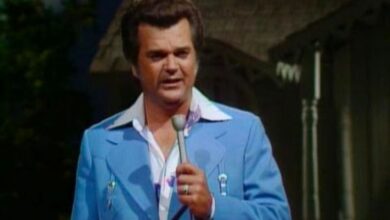Exploring Loretta Lynn’s Impact with ‘Don’t Come Home A-Drinkin’ (With Lovin’ on Your Mind)’ – A Country Classic
Loretta Lynn, an American country music singer, songwriter, and author, was known for her chart-topping single “Don’t Come Home A-Drinkin’ (With Lovin’ on Your Mind).” This song, released in 1966, became Lynn’s first number-one single on the Billboard Hot Country Singles chart in early 1967. It has since become one of Lynn’s signature songs, showing her as an astute and frank songwriter who was not afraid to tackle real issues faced by women in a male-dominated society.
“Don’t Come Home A-Drinkin’ (With Lovin’ on Your Mind)” is more than just a catchy tune; it has a poignant message that resonated with many women during the era. The song, co-written by Lynn and her sister Peggy Sue Wells, deals with the issue of alcoholism and the effects it has on a marriage. It expresses a woman’s frustration with her husband’s drinking problem and his expectations for romance after a night of indulging. The raw, honest lyrics and Lynn’s powerful vocals gave voice to the experiences and feelings of many women, establishing her as a champion for women’s issues in the country music scene.
The song was the title track of Lynn’s 1967 studio album, which was also her first album to top the Billboard Top Country Albums chart. The success of both the song and the album marked a turning point in Lynn’s career. It established her as one of the leading women in country music, a position she has held onto for more than five decades. Throughout her career, Lynn has been recognized for her role in breaking down barriers for women in country music with her bold, straightforward lyrics about women’s lives and experiences.
Not only did “Don’t Come Home A-Drinkin’ (With Lovin’ on Your Mind)” have a significant impact on Lynn’s career, but it also left a lasting imprint on the country music genre. The song is a fine representation of the honky-tonk style of country music, characterized by its hard-driving sound and lyrics about hard-drinking, blue-collar life. Its success helped pave the way for other female country artists to voice their own experiences and tell their own stories.
More than half a century after its release, “Don’t Come Home A-Drinkin’ (With Lovin’ on Your Mind)” continues to be celebrated. It was recognized by the Recording Academy in 1997 when Lynn’s original recording was inducted into the Grammy Hall of Fame. This honor, given to recordings of “lasting qualitative or historical significance,” is a testament to the song’s enduring relevance and impact.
Loretta Lynn’s “Don’t Come Home A-Drinkin’ (With Lovin’ on Your Mind)” stands as a pivotal song in the history of country music. Its success was a testament to Lynn’s talent as a singer and songwriter, and its message was a bold statement about the realities faced by many women. With this song, Lynn pioneered a new direction for country music and blazed a trail for future generations of female country artists.





